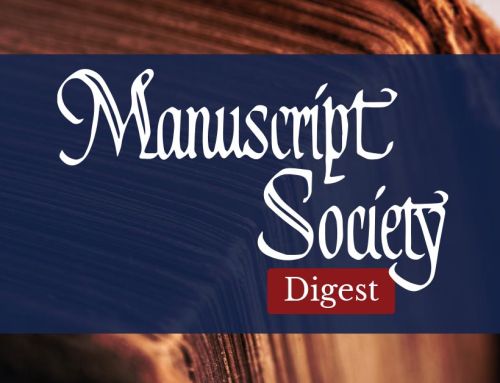Applications are due February 14, 2017, and decisions will be announced shortly after March 17.
About the Grant
The $5,000 grant supports research expenses directly related to use of original manuscripts, for example travel to manuscript repositories, photocopies, and user fees. Applicants must be graduate students—doctoral candidates are given preference—at an institution that belongs to the Manuscript Society. An institution qualifies as a member if its library subscribes to Manuscripts, the society’s quarterly journal.
The society issues the nonrenewable grant to the sponsoring institution, which disburses it to the recipient. Upon completing the research, the recipient must submit a detailed report to the society’s scholarship committee. The recipient also must recognize the society’s support in any publication resulting from the research. Recent recipients have used the grant to further students in early modern Europe’s relations with the Muslim world, Native American dialects, Dutch mercantilism in New Netherland and New York, 17th-century English scientific manuscripts, and Mexican president Làzaro Càrdenas.
How to Apply
Interested students should submit a letter of application, résumé, and budget along with a proposal précis of up to three double-spaced pages demonstrating that their research involves considerable work with original manuscripts. In addition, applicants should have two or three letters of recommendation sent to the scholarship committee, including one from the thesis or dissertation advisor. Each file name should start with the applicant’s surname, for example SmithProposal, SmithBudget, SmithSupportLetter, etc. All applicants will be notified of the scholarship committee’s decision soon after March 17, 2017.
Send inquiries to Elizabeth H. Dow at edow1@earthlink.net. Send applications and supporting letters to ManuscriptSocietyGrant@manuscript.org.
Criteria for Evaluating Maass Grant Applications
The Scholarship Committee will use the following criteria to evaluate Maass Grant applications.
- Does the scholar define clear objectives for the proposed activities?
- Does the scholar describe the manuscripts or manuscript types she or he will find and how they will support the research project?
- Does the scholar state clearly outcomes which connect fully with the purpose of the research?
- Does the scholar define the amount of work he or she will accomplish and will allow sufficient time to accomplish the work?
- Does the scholar’s CV show clearly that the proposed work falls well within his or her abilities?
- Does the scholar present a clearly detailed and realistic budget to explain how she or he will use the money?
- Does the proposed work have a direct and obviously important relationship to the scholar’s work?
- Does the scholar write in clear and lucid prose, organized so that one point or section flows logically into the next? The proposal should contain no grammatical or mechanical errors.
- Do the letters of reference express high regard for both the project’s importance and the scholar’s ability to carry it out, offering details about both?




Leave A Comment